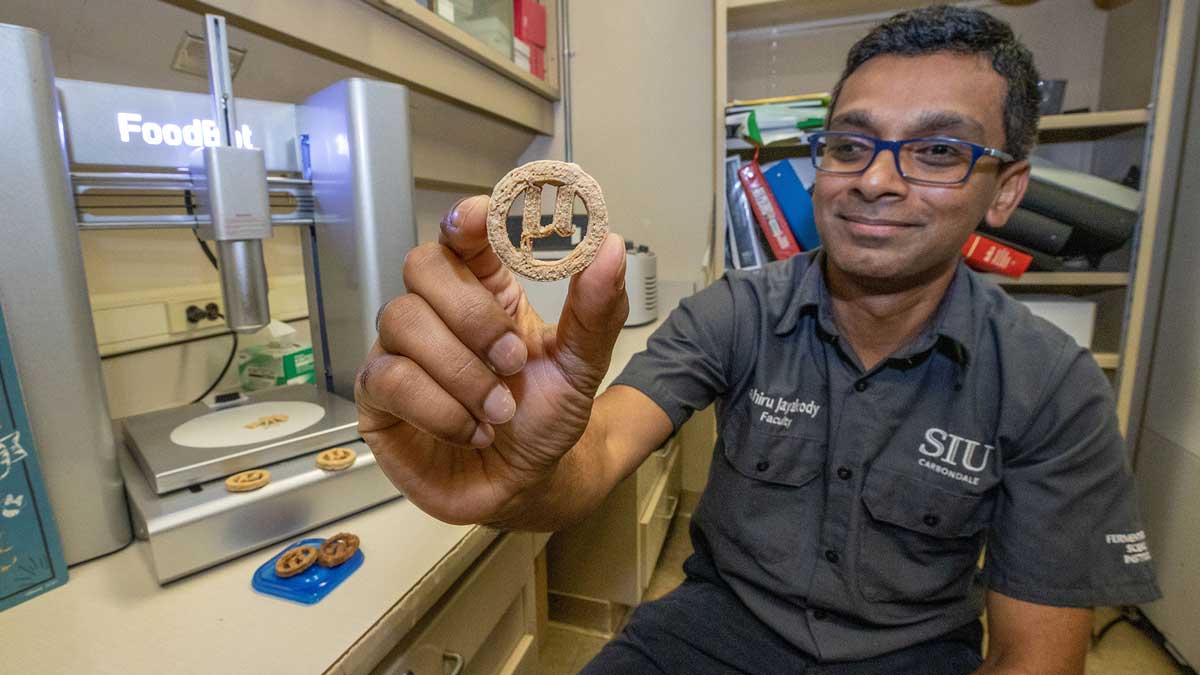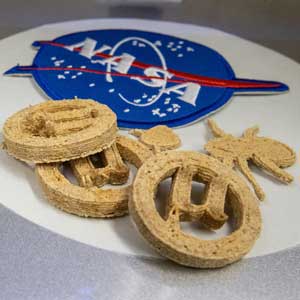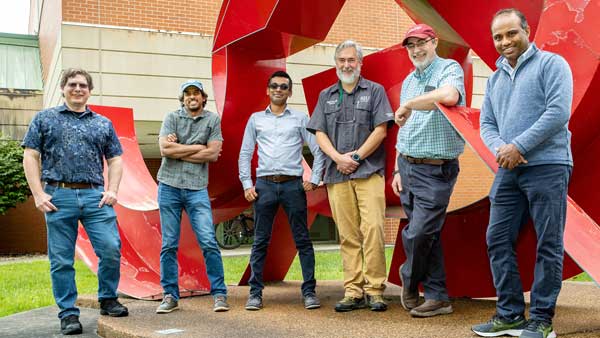
Lahiru Jayakody holds a 3D-printed cookie made from proteins garnered from biomass and plastic that has been processed by yeast. (Photos by Russell Bailey)
May 15, 2024
SIU researchers mitigate two problems by transforming waste plastic into food
CARBONDALE, Ill. – In the 1970s, it was Tang, the orange-like drink of astronauts, that found its way into the Earth-bound consumer market. Sometime during the next few years, it could be µBites – created by a team of researchers at Southern Illinois University Carbondale – that splashes down on dinner tables and helps solve an ecological problem.
While Tang boasted “flavor crystals” that provided a full day of vitamin C when mixed with water, µBites (which means “microbites”) emerges from waste biomass and plastic, processed into a slurry that specialized yeast, in turn, converts to proteins. The proteins can be 3D-printed into palatable items such as cookies or other foods.
Lahiru Jayakody, assistant professor in the School of Biological Sciences and the Fermentation Science Institute at SIU, is leading the team of researchers using a $25,000 grant from NASA’s Deep Space Food Challenge. The grant challenged teams around the nation to conceive novel food technologies to solve the problems of feeding astronauts on long voyages – and it has implications here on Earth.
“µBites is a transformative technology for treating world hunger and plastic pollution, creating a sustainable world for future generations,” Jayakody said.
The SIU team’s progress is summarized in an article published online today (May 15) in the Cell Press journal Trends in Biotechnology.
Addressing global issues
Jayakody said µBites could address critical worldwide challenges, including food scarcity, plastic waste accumulation and reducing the need for more carbon sources. Lack of access to farmland due to economic and political constraints, along with soil contamination, disease outbreaks, conflicts, wars and violence all impact food production and supplies.
“Food insecurity is a global and severe problem that affects millions of people,” Jayakody said. “And it will increase as climate change becomes more severe.”
The µBites food-generating system is efficient in water usage and requires minimal space for operation. Its modular design allows it to vary the product’s nutrient composition to fit the specific needs of various populations with cultural and culinary diversity, while its simplicity requires minimal human involvement.
“µBites can provide food in extreme environments and resource-scarce regions,” Jayakody said. “For example, it could be installed on naval ships, especially submarines or put in remote locations such as the Arctic and Antarctic, where it would provide a reliable food source when weather conditions prevent resupply runs by plane or boat.”
Key process
The system also presents a method for dealing with environmental problems, such as the accumulation of plastic waste. µBites depolymerizes plastics without creating toxic chemicals or carbon streams, using biological processes to transform it into a protein source with very low or zero greenhouse gas emissions.
It does this by feeding the waste to hungry yeast strains and then further processing the product. But in order to turn all that biomass and plastic into something palatable to yeast, the team uses an additional process previously invented by another SIU scientist.
Ken Anderson, director of SIU’s Advanced Energy Research Center, came up with the oxidative hydrothermal dissolution (OHD) technology a decade back as part of his work as a geology professor. OHD uses water, heat, pressure and oxygen to break down and transform biomass and plastic into water-soluble carbon molecules.
After grinding biomass and plastics into a uniform slurry, it is then sent into an OHD reactor for processing. The step makes the substance accessible to the hungry microbes, like yeast, that perform the next step in µBites.
Final preparation involves shaping the consumable into a desired consistency, ranging from semi solid to liquid. It can be further mixed with dried spices or supplements to achieve the final, highly customizable result. (View a 2-minute video illustrating the process.)
Cookies, anyone?
 Jayakody and the team recently demonstrated the workability of their idea by creating cookies made from the µBites process and using 3D printing technology. Once the team members had successfully tested the finished product for safety and nutritional parameters, they conducted a taste test with humans – formally called a sensory analysis – at SIU’s Fermentation Science Institute, which routinely conducts such trials on fermented beverages and foods. Marta Albiol Tapia, assistant professor of practice at FSI, an expert in consumer analysis, designed and conducted the test.
Jayakody and the team recently demonstrated the workability of their idea by creating cookies made from the µBites process and using 3D printing technology. Once the team members had successfully tested the finished product for safety and nutritional parameters, they conducted a taste test with humans – formally called a sensory analysis – at SIU’s Fermentation Science Institute, which routinely conducts such trials on fermented beverages and foods. Marta Albiol Tapia, assistant professor of practice at FSI, an expert in consumer analysis, designed and conducted the test.
The results showed an overall positive acceptability of the product, Jayakody said, scoring a 6.5 of 9 on the Hedonic scale, the most widely used measure of food acceptability. The “aroma” of the produced cookies scored the highest, with a mean of 7.33 and over 5 for color, shape and texture.
“To our knowledge, this is the first-ever, demonstrably safe-to-eat cookie with a Hedonic scale score greater than 6.5 from repurposed waste biomass and plastic,” Jayakody said.
Challenges remain
Along with Jayakody and Anderson, the SIU research team also includes FSI Director Matt McCarroll, Scott D. Hamilton-Brehm, associate professor of microbiology, Poopalasingam Sivakumar, associate professor of physics, and Gayan L. Aruma Baduge, associate professor in the School of Electrical, Computer and Biomedical Engineering. Researchers from other universities also are working on the project.
One of the main challenges remaining, Jayakody said, is getting consumers to accept waste-derived alternative food, such as that created by µBites, as well as enacting policies aimed at transitioning people to novel, sustainable diets. The team also includes Kaustav Majumder, University of Nebraska-Lincoln; Iwona M. Jasiuk, University of Illinois Urbana-Champaign, and Rina R. Tannenbaum, Stony Brook University.
The team is seeking to accelerate its development funding from federal agencies and industrial partners to build a fully integrated and automated µBites system. The researchers also hope to develop methods that will expand the product’s nutrient content to include essential vitamins, flavor and aroma compounds.
“We also want to conduct public awareness and educational programs on µBites technology, since social changes are needed for consumer acceptance of this new product,” he said.
View a short video of Jayakody explaining the project.

